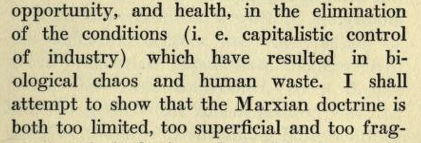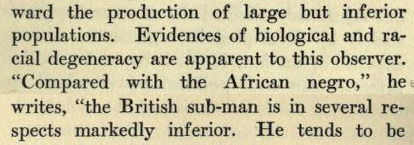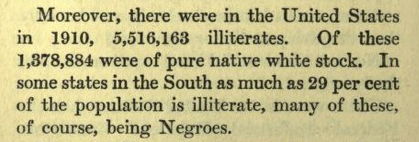This post contains a sampling of documented quotes by Margaret Sanger on the topics of race and eugenics. I say “documented” because (unlike most other Web pages citing Sanger) in each case I provide a direct link to scanned pages from the original editions of books she wrote featuring these quotes, which have been put online by a politically neutral academic library whose impartiality is unimpeachable; furthermore, I provide photographs of each quote in situ from her various books, along with accurate transcriptions.
The reason for these extreme steps is that one must be very careful when researching online the intersection of Margaret Sanger
, eugenics and race, because her modern defenders (that is, Planned Parenthood and other “pro-choice” advocates) do everything they can to suppress and deny Sanger’s racism, while on the other hand her detractors (“pro-life” advocates) often cite abbreviated quotes from her in order to make it look like she was only racist against blacks — when in fact she was also racist against immigrant groups, other minorities, and “defectives” of any skin color, all of whom threatened what Sanger saw as the “purity” of the educated white middle and upper classes.
The following quotes are all taken from two of Margaret Sanger’s books: The Pivot of Civilization, published in 1922; and Woman and the New Race, published in 1920. There are countless other Sanger quotes about race and eugenics, not just in these two books but in many of her other books as well, not to mention various letters and essays of hers which have been preserved. The quotes you see here, therefore, are not a thorough examination of her views on these topics, but rather just a few verified examples which researchers, pundits and advocates on either side can use, cite, republish, download or link to freely.
The Pivot of Civilization, by Margaret Sanger (1922)
Available online here in its original format at Open Library
or as searchable text at Project Gutenberg.
That Margaret Sanger was an enthusiastic eugenicist
, and that her beliefs were essentially racist (and classist), is beyond dispute. Take for example this random quote from pages 175-6 of The Pivot of Civilization:

Sanger summarizes her guiding “Principles” on page 279, in which she declares that low-class children are “unwanted types” who “should never have been born”:

Sanger founded Planned Parenthood to counteract the influence of the typical “maternity center” of the day, whose pro-life advice to lower-class pregnant women

The phrase “human waste” in the quote above was no fluke; in fact, Sanger made a habit of describing the lower classes (i.e. children of immigrants and minorities) as “human waste“:


Sanger’s reflexively low opinion of blacks can be seen on pages 131-2 of The Pivot of Civilization, where she first writes
and then goes on to approvingly quote another eugenicist who claims that factory work has degraded the intellect of the British lower classes to the level of (gasp!) “the African negro”:
There’s no question that in this context “negro” is cited as the benchmark for racial inferiority, a degenerate state to which the white British man is unfortunately descending.

On pages 84-7 of Pivot, Sanger once again reveals her true opinions by using the example of a black family to illustrate how “feeble-minded” women contaminate society with their criminal offspring:
The quote then goes on for several paragraphs to list how nearly all of the black woman’s children had become scourges on society:
and so on for all sixteen black children. Sanger concludes,
[Click on image to view full-size]

Woman and the New Race, by Margaret Sanger (1920)
Available online here in its original format at Open Library
In her 1920 tract Woman and the New Race, Sanger sometimes expressed the kind of deep racism typical of the era which was so thoroughly intertwined with her worldview that it usually didn’t even need to be mentioned because it was the starting point of the discussion.
For example, when talking about how large family sizes lead to illiteracy on page 38, Sanger casually describes white people as being of “pure stock” whereas the high rate of Negro illiteracy merits an “of course” which needs no further explanation:

On page 31 of the same book, Sanger reveals a view of racial hierarchies which in modern terms would be deemed incredibly racist: At the bottom are “Negroes, Indians, Chinese,” all of whom count as “colored”; next comes not only anyone born outside the United States (mostly immigrants from southern and eastern Europe, as the text later reveals) but also their American-born children, all of whom still nonetheless count as “of foreign stock”; and at the top, needless to say, are Caucasians who have lived in the United States for multiple generations, who are “native white”:

The goal of birth control in Sanger’s view was to decrease the number of babies being born to “lower” types, while increasing the number of offspring produced by “the native white strain.” To this end, Sanger arranged to have one of her birth-control how-to manuals translated into Yiddish so that new Jewish immigrants could learn how to avoid pregnancy (and — the whole point — thereby limit Jewish population growth in the United States).
More quotes from Margaret Sanger expressing similar sentiments can be found throughout the two books cited above, as well as in one more of her books which is also available online:
— The Case for Birth Control, available in its entirety here at Open Library
All images, quotes and text on this page are free to download and republish, with no restrictions.

20 Responses to “Margaret Sanger quotes about race and eugenics”